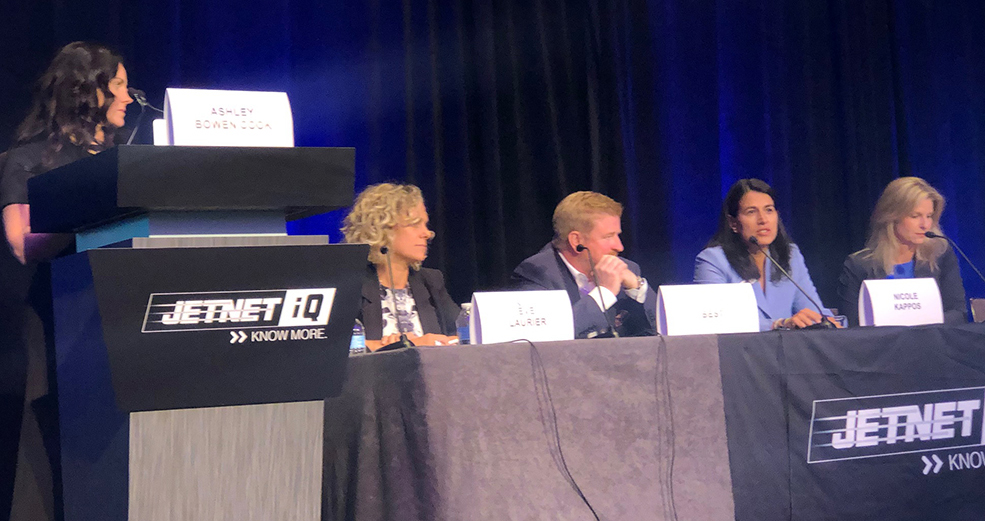JETNET iQ Showcases BizAv’s Future
09.22.22 · Ashley Bowen Cook
There are some invitations you don’t turn down. When long-time agency friend, JETNET iQ program creator and director Rollie Vincent, asked me to moderate a panel at the group’s annual conference in New York City, I jumped at the chance. The highly respected event brings together industry heavy hitters and covers business aviation topics from customer service to the state of the industry.

Blue Skies. Greener Future.
An appropriate theme for this year’s gathering. The agenda is always full of timely topics. Sustainability. New buyers in the market. Supply chain issues not constrained by demand, but by supply. Talent acquisition and retention. Technology and advanced air mobility. Each 50-minute session with hand-selected speakers over a day and a half only touched on subjects we could have discussed for a week.
Leading the Charge on Green: Changing the Narrative
Sustainability will not only continue to be part of the conversation, but it is a must. There was extensive discussion on embracing sustainability efforts. We have the opportunity to lead the charge. The general public doesn’t understand the economic impact of aircraft from jobs to taxes to imports. We need to control the narrative.There continues to be a massive perception problem of old, entitled, arrogant rich men, and we have to change it. Business aviation connected the world when Covid hit and made people recognize its value.
Building Our Human Capital Pipeline
We’re working to revive the love of aviation in kids. We have to bring STEM into school and work to attract talent at a young age. Aviation has talent, good pay and benefits, and a great culture. What attracts people to a company? For the younger generation, it may be the social impact. What good things are you doing? We need to live and breathe the values of the company and showcase them.
Mach Speed Transactions
High-performing, high-net-worth people added to private aviation during the pandemic. We hear conversations you didn’t hear before of people flying privately. If they get used to it and can afford it, they will stay.
The volume and speed of transactions has changed. OEM book-to-bill ratios are solid with large backlogs. Preowned inventory is creeping up. If you are looking for aircraft, picking up the phone and connecting with other brokers is the best shot. No substitute for relationships.

Tomorrow’s Customers
My panel focused on the new face of the customer and how they want to interact with a brand. I was joined by Eve Laurier, Bombardier; David Best, Jet Aviation; Ruth Devey, Gulfstream Aerospace; and Nicole Kappos, Pratt & Whitney Canada (pictured above, seated L to R).
Let’s face it, the “typical” user of private aviation has changed considerably since March 2020 and so has the way they want to interact with the buying cycle. While you still have some customers who want a more traditional experience, you also have those who want to text a CEO to purchase their multi-million dollar jet. There has been a digital transformation in interacting with younger, more diverse customers and first-time buyers. They want the information faster and at their fingertips, but there also had to be more handholding and educating new buyers. Patterns of use have changed. The people utilizing the aircraft have changed. Women are making more key decisions. Providing a bespoke experience for each customer is what will make them loyal to a brand.
In providing good customer service to new and existing clients, responsiveness, reliability, consistency are the themes. We protect the brand by doing what’s right for the customer. They want to talk to a person, and to someone who cares. Strive to understand the customer’s why. Focus on sustainability.
The Outlook
Aircraft owners and operators are optimistic. The industry is looking good for the remainder of the year and into 2023. It will take all of us collectively to move the needle on sustainability, advocacy and attracting the next generation of aviators.
(Photos courtesy of JETNET iQ)
